
Made in the UK aims to research and propose strategies to increase economic, cultural and social resilience in post-industrial northern rural mining towns in the UK, through stimulating the eco-economy of off-site manufacturing.

Located between the Government’s northern powerhouse cities of Sheffield and Leeds, indirect economic effects are not trickling along the Dearne Valley; exacerbating the economic polarisation between City and rural towns.

The Dearne Valley was built on labour for the mining industry, and the valley was unusually reliant on this monocultural labour source. The communities social and cultural values were embedded in the labour of mining. A casualty of coalmine closures from the mid-1980s has left a hole in the area’s collective labour identity, resulting in swathes of economically stagnant communities without localised labour opportunities.
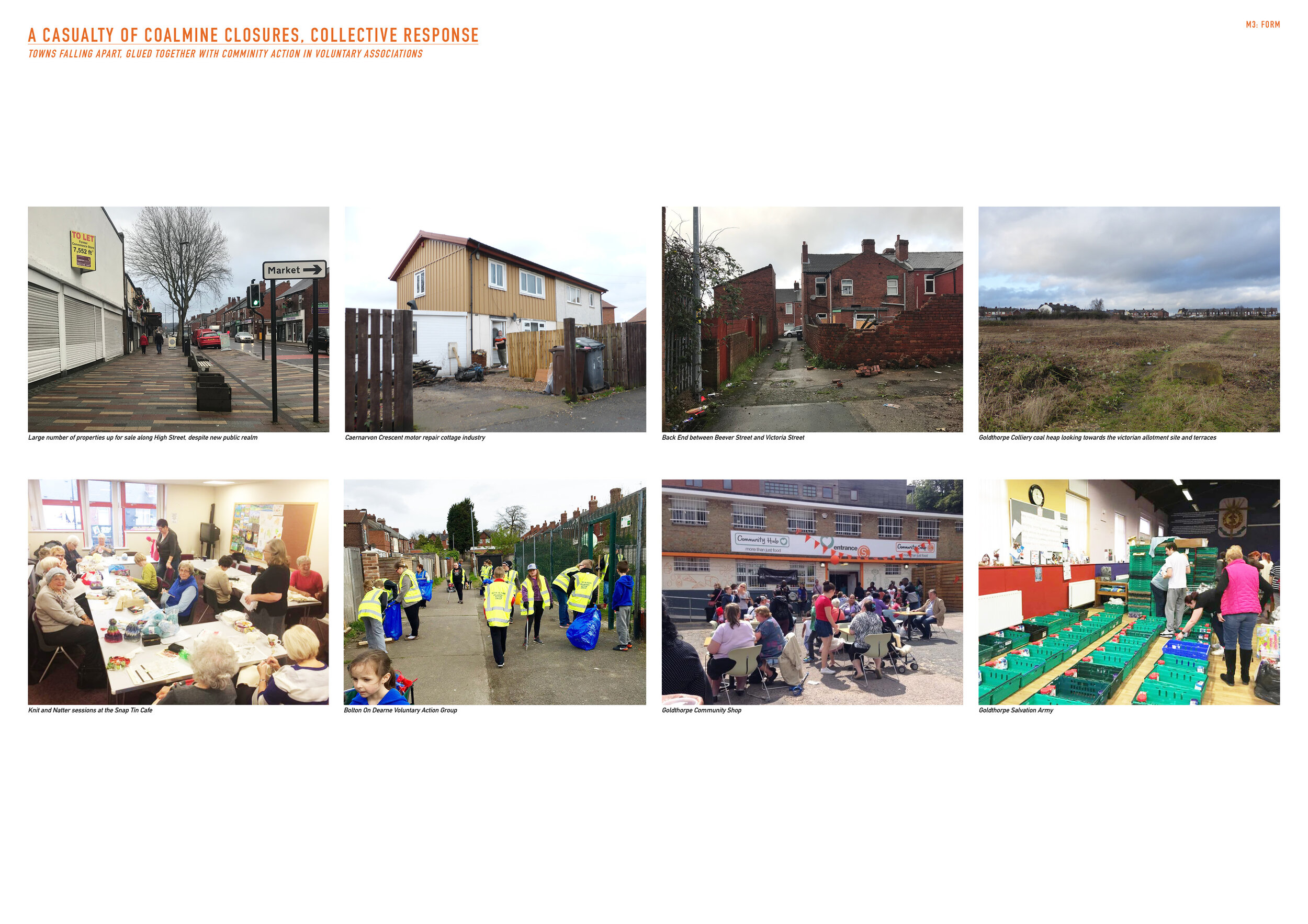
Since continually neglected by the state, the Dearne Valley struggles to survive three decades on as one of the most deprived areas in the country. Yet the sense of community is strong, held together by voluntary organisations, an enduring legacy of collective action from the mining era.

The Dearne Valley has issues symptomatic of many northern rural mining towns. Following Brexit and the withdrawal of EU funding, farmland owners are putting swathes of underutilised landscape up for sale.

Poor transport links, low educational attainment and health issues restrict social mobility, leaving the Dearne Valley community isolated.
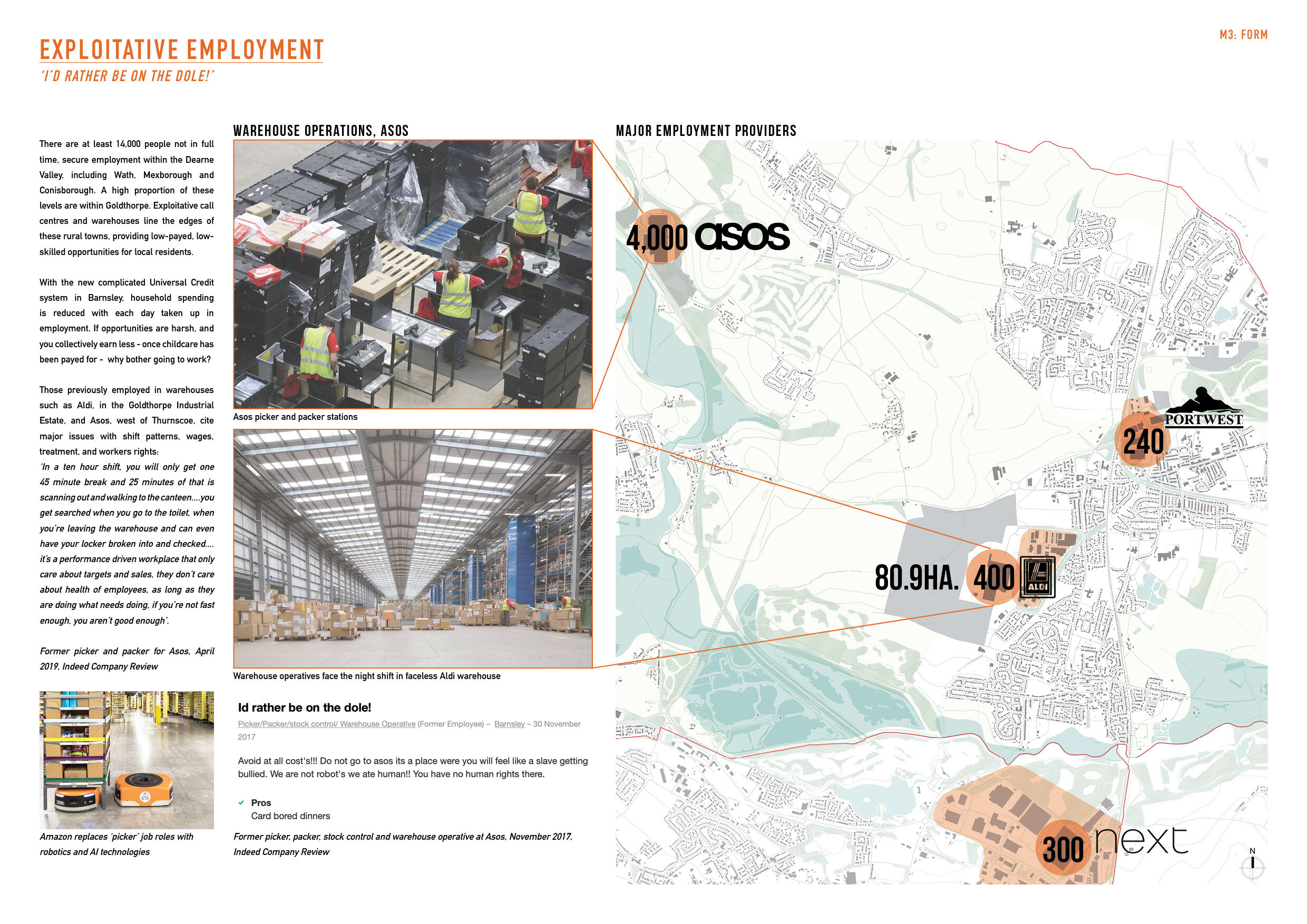
In a short-term bid to reduce unemployment levels in the Dearne, the Conservative government approved Enterprise Zones to create thousands of skilled manufacturing jobs. What resulted was an attraction of call centres and distribution warehouses, serving profit-driven large corporations, such as ASOS and Aldi, interested in tax exemptions and a low-cost, desperate labour force. Yet trends in automation and future of labour theorists predict most of these jobs vulnerable to technological unemployment in the very near future.

With only the most dexterous of roles in warehousing and logistics labour remaining, the future of labour in the Dearne Valley paints a bleak and unforgiving picture, of which corporations such as Amazon have already deployed.

Projecting to an urban scale forms ‘machine landscapes’, serving a consumerist society, and taking up swathes of greenbelt to house such forms of labour in the most deprived rural areas, forming a societal issue.

The latest government attempt to remedy the present is through a construction corridor, supported by the future of labour debate, as construction and repairs are some of the least likely labour sectors within the Dearne Valley to be replaced by robotics and technology, according to data from Frey and Osbourne. However, large government statements offer little consideration for the broader impact of the construction sector on the environment, responsible for 40% of the UK’s carbon emissions, and for vast amounts of landfill waste.

Local councils such as Barnsley will do anything for a quick labour fix for the Dearne Valley, proposing an 81ha extension to an employment zone in Goldthorpe, offering the same future fate as the existing labour opportunities. If we accept that automation has a technological momentum that will work to shape the built environment, rather than stepping aside to let technology run its course, there is an opportunity to treat this as an architectural issue, and posit an alternative.
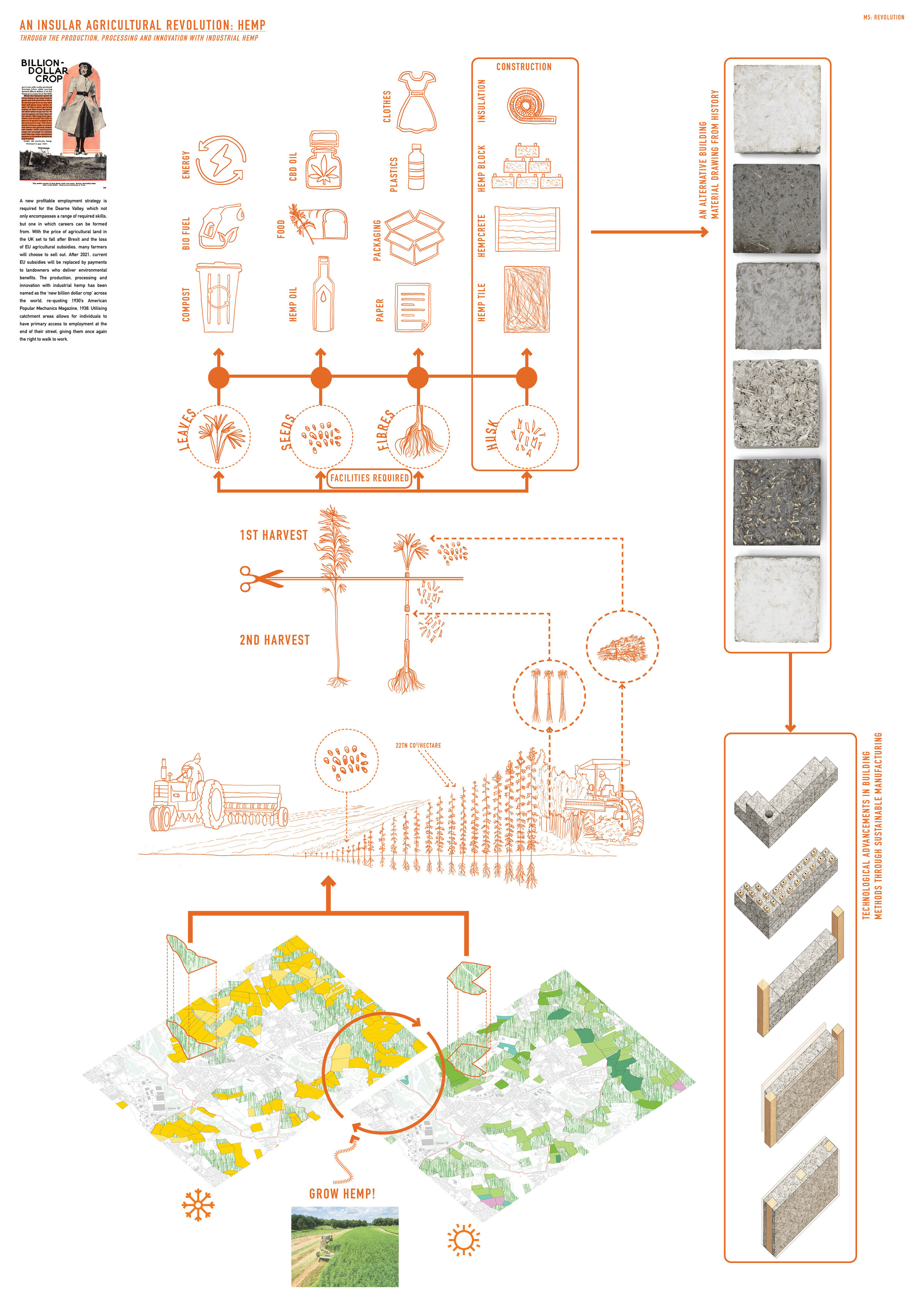
Using the agricultural production, processing and innovation with industrial hemp as an alternative future rural labour model based on the availability of land, the sequestration of vast amounts of carbon emissions and the possible opportunities for a range of labour types - from construction to bio-energy and super-food products - and labour positions – from monitoring crops and techno-agricultural innovation, to product innovation – attempts to ensure future labour resilience.

With the purchase of available arable land by local government on behalf of a re-established Dearne Valley Union, the proposal aims to return to the agricultural commons open field system, for the collective cultivation of industrial hemp as a rotational crop.

Aiming to remedy the historic destruction to the landscape...

...this proposal restores the anthropocentric landscape, enhancing local biodiversity, forging an asset to the local communities, supported financially by government’s agri-environmental grants.

Positing an agri-construction eco-revolution in the Dearne Valley from an extractive past, to a sustainable future, through exploring resilience as a long term strategy, rather than a short term ‘fix’.

So far in this research, the urban strategy, and architectural interventions have been explored in more detail at the neighbourhood block scale, focusing on the cultivation, processing and innovation with industrial hemp for hempcrete blocks as an off-site construction material – alongside the inclusion of neighbourhood civic spaces; a technical college, nursery, office, kitchen and café.

Explored over the course of time sees: The Valley as Industry in 2022, with the formation of local hemp associations, and localised employment combining industry with civic spaces, rebuilding the labour identity of the neighbourhood.

To The Valley as start-up in 2030, where the Dearne Valley becomes the hemp innovation centre of the UK, re-establishing the importance of the rural landscape.

To the Valley as cooperative in 2040, where the purchase of any value of shares in the co-operative gives community individuals a membership to the agricultural commons and an equal right to the land. 10% of a plot can be used for self-built housing using locally sourced materials along a rural linear street village where planning permission is not required, the remaining 10% for food allotments, and 80% for the collective cultivation of hemp.

This forms an alternative possible future of labour rooted in social, ecological, and collective values for the stewardship of the Dearne Valley landscape…
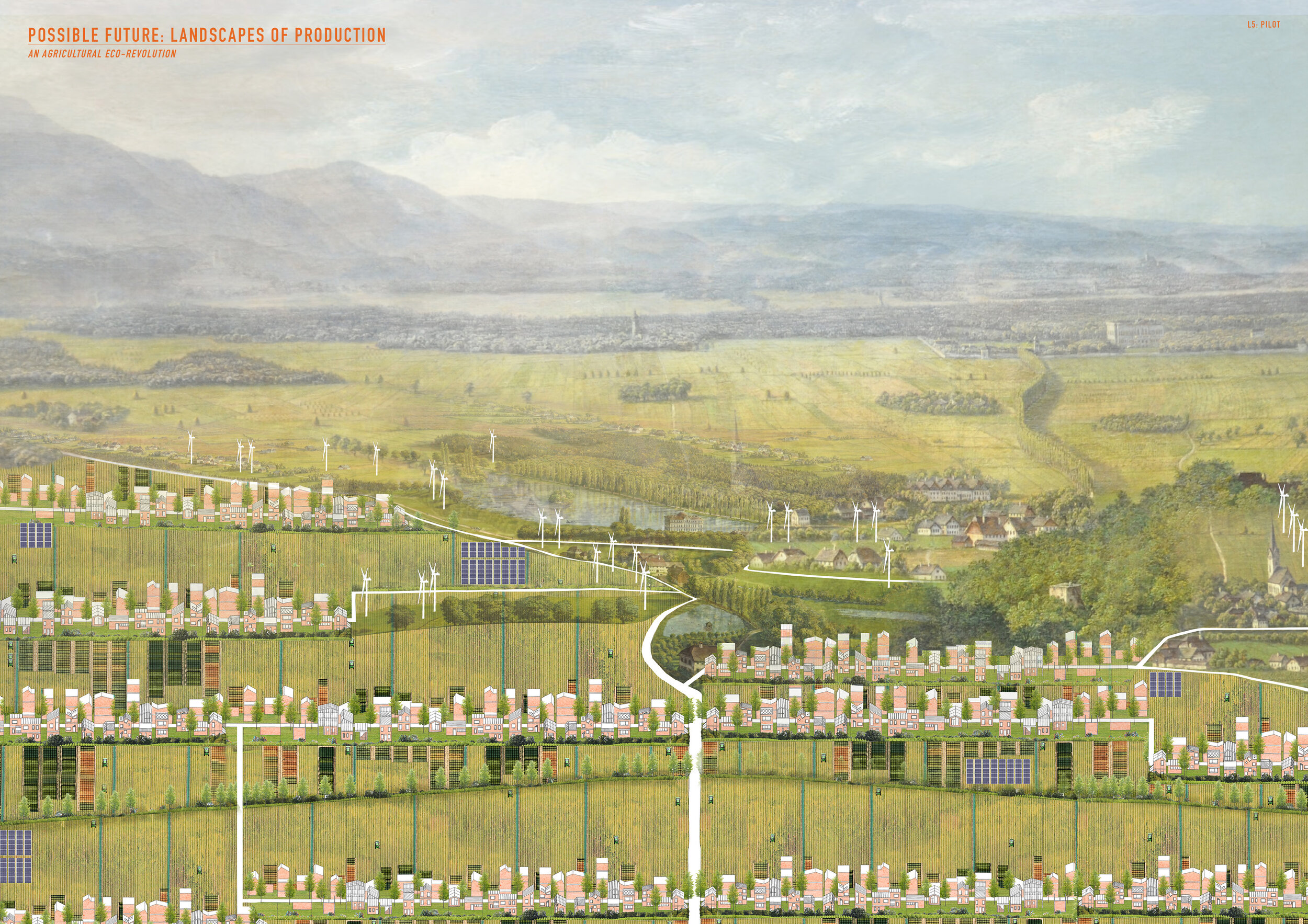
...resulting in landscapes of production for an ecological, resilient future, towards a new rural.

This pilot project has focused on the rural linear street village model as way of developing the Dearne to deal with projected population growth, and an initial design exploration of an eco-industrial typology.

Yet, there are multiple alternative land management models beyond the rural linear street village, proposed typologies and ecological integration to explore in the Dearne such as: the organic clusters of Kralingen, integrating a selection of labour and housing built forms within a natural parkscape; the structured grid of Tramhaus with standardised built footprints and biodiversity gardens with no vehicular access; and Almere Oosterwold, with a liberal approach to built forms and landscape use, in a more biocentric approach with regulations to ensure accessible and biodiverse landscaping – for which this project aims to explore moving forward.
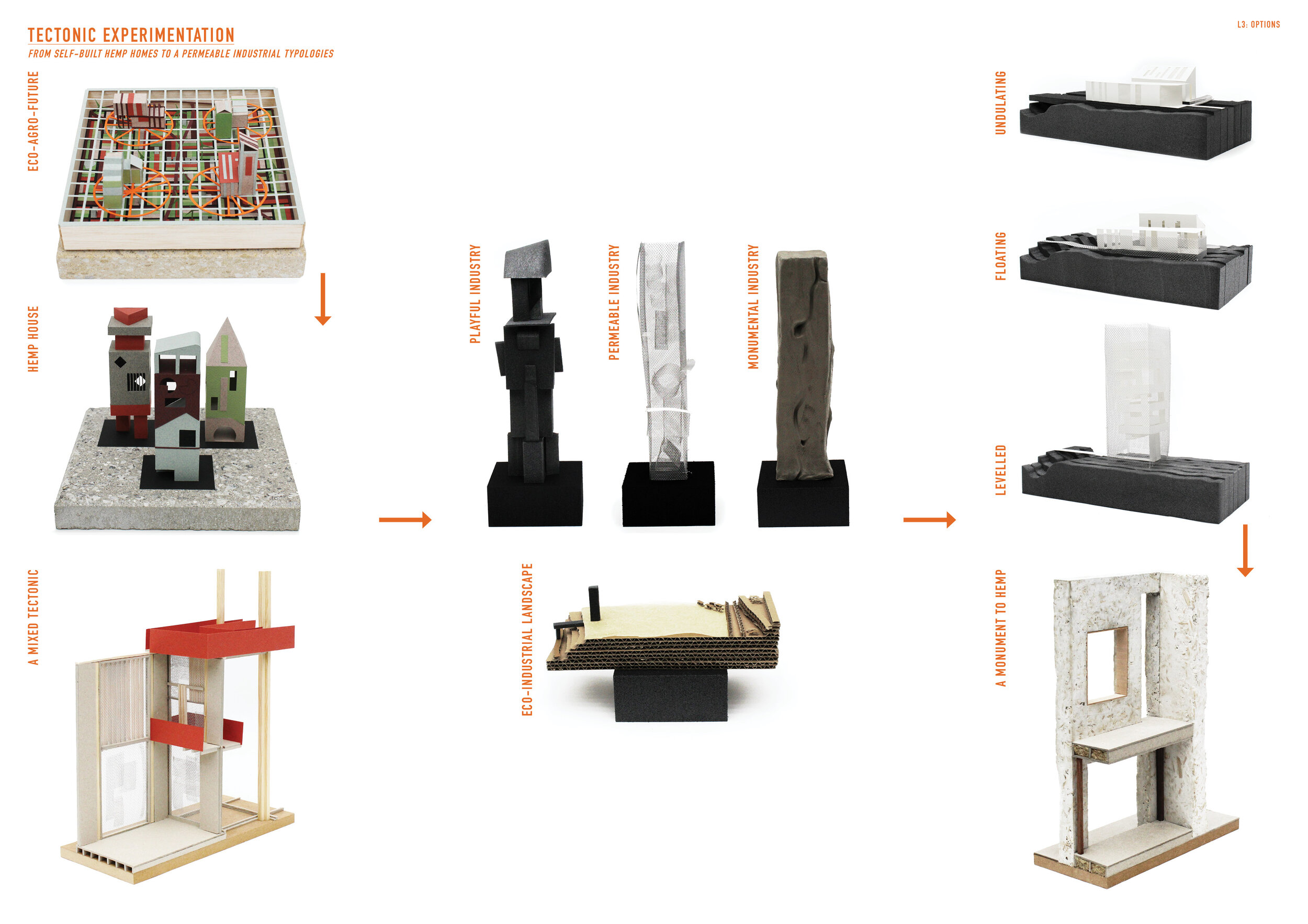
Additionally, there are multiple avenues in which innovative industrial and housing typologies could represent this ecological alternative future of labour, dwelling and townscape.

Speculating how to integrate civic, industrial and landscape elements to operate beyond labour, towards a collective identity.

Experimenting with a series of volumetric tectonics

It is clear that a return to the material properties of industrial hemp will be helpful in gathering a physical understanding of how the material works in practice, in order to develop an approach to how this could be incorporated into an ecological off-site manufacturing process, and the labour opportunities.

Made in the UK stems from an understanding of the historical, current and possible futures of labour to determine an alternative response through design to speculate how labour could be positioned in a more forward thinking, ecologically aware society as a path to lead to future resilience in the rural landscapes of the Dearne Valley.
